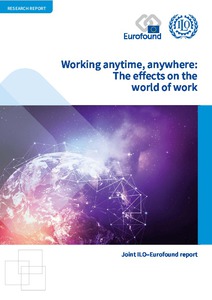Working anytime, anywhere: the effects on the world of work
"The new report Working anytime, anywhere: The effects on the world of work synthesises research carried out by both organisations in 15 countries, including ten EU Member States as well as Argentina, Brazil, India, Japan and the United States. The study identifies several types of employees us...
| Institution: | ETUI-European Trade Union Institute |
|---|---|
| Format: | TEXT |
| Language: | English |
| Published: |
Luxembourg
2017
Publications Office of the European Union |
| Subjects: | |
| Online Access: | https://www.labourline.org/KENTIKA-807012462529-Working-anytime,-anywhere-the-.htm |
| _version_ | 1771659896620580866 |
|---|---|
| collection | Library items |
| description | "The new report Working anytime, anywhere: The effects on the world of work synthesises research carried out by both organisations in 15 countries, including ten EU Member States as well as Argentina, Brazil, India, Japan and the United States. The study identifies several types of employees using new technologies to work outside the employer’s premises, including regular home-based teleworkers, workers performing occasional telework and ICT-mobile work (T/ICTM).
The report highlights a number of positive effects of T/ICTM work, such as greater working time autonomy leading to more flexibility in terms of working time organisation, and reduced commuting time resulting in a better overall work-life balance and higher productivity. It also identifies several disadvantages such as a tendency to work longer hours, and an overlap between paid work and personal life – which can lead to high levels of stress. The report draws clear distinctions between home-based teleworkers who seem to enjoy better work-life balance and ‘high-mobile’ workers who are more at risk of negative health and well-being outcomes.
The report provides recommendations in order to address this disparity, such as promoting formal part-time teleworking to help teleworkers maintain ties with their co-workers and improve worker well-being, while restricting informal and supplemental T/ICTM work involving long working hours.
Currently only the EU has an overall framework to adapt to digital change on telework, with the European Framework Agreement on Telework. However, most existing initiatives are related to formal, home-based telework, while problems seem to be more recurrent with informal, occasional T/ICTM work.
As telework becomes more prominent so too has the need to disconnect in order to separate paid work and personal life, with France and Germany beginning to look at arrangements at the company level, and at existing and new legislation. In the future this may result in concrete measures to make working life less pervasive, such as shutting down computer servers outside working hours in order to prevent emails during rest times and holidays, which is already happening in some companies." |
| format | TEXT |
| geographic | EU countries |
| id | 807012462529_d2d2569c89e443dfbac10df5a89d2815 |
| institution | ETUI-European Trade Union Institute |
| is_hierarchy_id | 807012462529_d2d2569c89e443dfbac10df5a89d2815 |
| is_hierarchy_title | Working anytime, anywhere: the effects on the world of work |
| language | English |
| physical | 72 p. Digital |
| publishDate | 2017 |
| publisher | Luxembourg Publications Office of the European Union |
| spellingShingle | information technology international labour standard occupational safety and health telework work-life balance working time digitalisation Working anytime, anywhere: the effects on the world of work |
| thumbnail | https://www.labourline.org/Image_prev.jpg?Archive=105459192363 |
| title | Working anytime, anywhere: the effects on the world of work |
| topic | information technology international labour standard occupational safety and health telework work-life balance working time digitalisation |
| url | https://www.labourline.org/KENTIKA-807012462529-Working-anytime,-anywhere-the-.htm |

